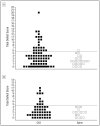A controlled prospective study of neuropsychological dysfunction following carotid endarterectomy
- PMID: 11843692
- PMCID: PMC2435245
- DOI: 10.1001/archneur.59.2.217
A controlled prospective study of neuropsychological dysfunction following carotid endarterectomy
Abstract
Background: Although subtle cognitive injury as revealed by neuropsychological testing occurs in a substantial number of patients following carotid endarterectomy (CEA), there is controversy about whether this finding is a result of the surgery or the anesthesia.
Objectives: To examine the changes in neuropsychological test performance in patients following CEA vs a control group of patients older than 60 years following spine surgery, so as to determine whether neuropsychological dysfunction after CEA is a result of surgery or anesthesia.
Methods: Patients undergoing CEA (n = 80) and lumbar spine surgery (n = 25) were assessed with a battery of neuropsychological tests preoperatively and on postoperative days 1 and 30. The neuropsychological performance of patients in the control group was used to normalize performance for patients in the CEA group, by calculating z scores using the mean and SD of the change scores in the control group. Significant cognitive dysfunction was defined as performance that exceeded 2 SDs above the mean performance of patients in the control group.
Results: Postoperative days 1 and 30 total deficit scores were significantly worse in the CEA group compared with the controls. When individual test results were examined, the CEA group performed significantly worse than the controls on the Rey Complex Figure test and Halstead-Reitan Trails B on day 1, and on the Rey Complex Figure on day 30. Overall, cognitive dysfunction was seen in 22 patients (28%) in the CEA group on day 1 and in 11 (23%) of 48 patients on day 30.
Conclusions: Subtle cognitive decline following CEA occurs and persists for at least several weeks after surgery. This decline was absent in a control group.
Figures

References
-
- North American Symptomatic Carotid Endarterectomy Trial Collaborators Beneficial effect of carotid endarterectomy in symptomatic patients with high-grade carotid stenosis. N Engl J Med. 1991;325:445–453. - PubMed
-
- Hobson RW, II, Weiss DG, Fields WS, et al. Efficacy of carotid endarterectomy for asymptomatic carotid stenosis. N Engl J Med. 1993;328:221–227. - PubMed
-
- Executive Committee for the Asymptomatic Carotid Atherosclerosis Study Endarterectomy for asymptomatic carotid artery stenosis. JAMA. 1995;273:1421–1428. - PubMed
-
- European Carotid Surgery Trialists’ Collaborative Group MRC European Carotid Surgery Trial: interim results for symptomatic patients with severe (70-99%) or with mild (0-29%) carotid stenosis. Lancet. 1991;337:1235–1243. - PubMed
-
- Kelly MP, Garron DC, Javid H. Carotid artery disease, carotid endarterectomy, and behavior. Arch Neurol. 1980;37:743–748. - PubMed
Publication types
MeSH terms
Grants and funding
LinkOut - more resources
Full Text Sources
Medical

